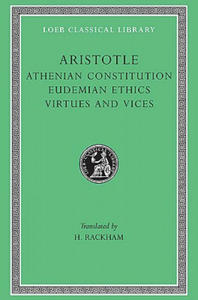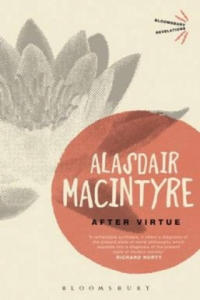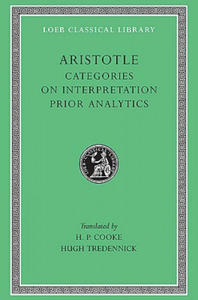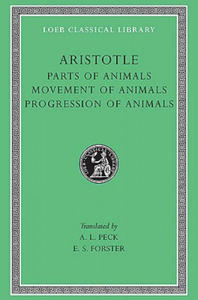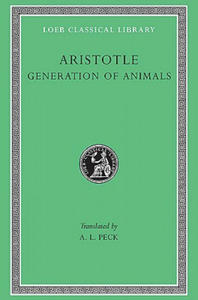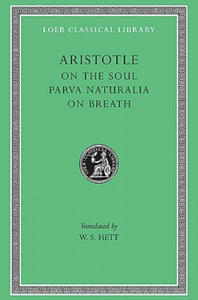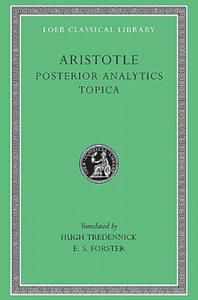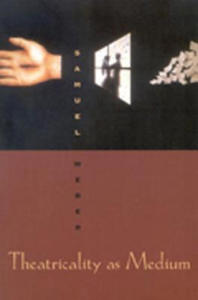libristo ethics after aristotle 4636428
- znaleziono 12 produktów w 1 sklepie
Athenian Constitution. Eudemian Ethics. Virtues and Vices Harvard University Press
Książki / Literatura obcojęzyczna
Aristotle, great Greek philosopher, researcher, reasoner, and writer, born at Stagirus in 384 BCE, was the son of Nicomachus, a physician, and Phaestis. He studied under Plato at Athens and taught there (367 47); subsequently he spent three years at the court of a former pupil, Hermeias, in Asia Minor and at this time married Pythias, one of Hermeias s relations. After some time at Mitylene, in 343 2 he was appointed by King Philip of Macedon to be tutor of his teen-aged son Alexander. After Philip s death in 336, Aristotle became head of his own school (of Peripatetics ), the Lyceum at Athens. Because of anti-Macedonian feeling there after Alexander s death in 323, he withdrew to Chalcis in Euboea, where he died in 322. Nearly all the works Aristotle prepared for publication are lost; the priceless ones extant are lecture-materials, notes, and memoranda (some are spurious). They can be categorized as follows: I. Practical: "Nicomachean Ethics"; "Great Ethics" ("Magna Moralia"); "Eudemian Ethics"; "Politics"; "Oeconomica" (on the good of the family); "Virtues and Vices." II. Logical: "Categories"; "On Interpretation"; "Analytics" ("Prior" and "Posterior"); "On Sophistical Refutations"; "Topica." III. Physical: Twenty-six works (some suspect) including astronomy, generation and destruction, the senses, memory, sleep, dreams, life, facts about animals, etc. IV. "Metaphysics" on being as being. V. On Art: "Art of Rhetoric" and "Poetics." VI. Other works including the "Athenian Constitution"; more works also of doubtful authorship. VII. Fragments of various works such as dialogues on philosophy and literature; and of treatises on rhetoric, politics and metaphysics. The Loeb Classical Library(r) edition of Aristotle is in twenty-three volumes.
Sklep: Libristo.pl
After Virtue Bloomsbury Publishing
Książki / Literatura obcojęzyczna
Highly controversial when it was first published in 1981, Alasdair MacIntyre's After Virtue has since established itself as a landmark work in contemporary moral philosophy. In this book, MacIntyre sought to address a crisis in moral language that he traced back to a European Enlightenment that had made the formulation of moral principles increasingly difficult. In the search for a way out of this impasse, MacIntyre returns to an earlier strand of ethical thinking, that of Aristotle, who emphasised the importance of 'virtue' to the ethical life. More than thirty years after its original publication, After Virtue remains a work that is impossible to ignore for anyone interested in our understanding of ethics and morality today.
Sklep: Libristo.pl
Categories. On Interpretation. Prior Analytics Harvard University Press
Książki / Literatura obcojęzyczna
Aristotle, great Greek philosopher, researcher, reasoner, and writer, born at Stagirus in 384 BCE, was the son of Nicomachus, a physician, and Phaestis. He studied under Plato at Athens and taught there (367 47); subsequently he spent three years at the court of a former pupil, Hermeias, in Asia Minor and at this time married Pythias, one of Hermeias s relations. After some time at Mitylene, in 343 2 he was appointed by King Philip of Macedon to be tutor of his teen-aged son Alexander. After Philip s death in 336, Aristotle became head of his own school (of Peripatetics ), the Lyceum at Athens. Because of anti-Macedonian feeling there after Alexander s death in 323, he withdrew to Chalcis in Euboea, where he died in 322. Nearly all the works Aristotle prepared for publication are lost; the priceless ones extant are lecture-materials, notes, and memoranda (some are spurious). They can be categorized as follows: I. Practical: "Nicomachean Ethics"; "Great Ethics" ("Magna Moralia"); "Eudemian Ethics"; "Politics"; "Oeconomica" (on the good of the family); "Virtues and Vices." II. Logical: "Categories"; "On Interpretation"; "Analytics" ("Prior" and "Posterior"); "On Sophistical Refutations"; "Topica." III. Physical: Twenty-six works (some suspect) including astronomy, generation and destruction, the senses, memory, sleep, dreams, life, facts about animals, etc. IV. "Metaphysics" on being as being. V. On Art: "Art of Rhetoric" and "Poetics." VI. Other works including the "Athenian Constitution"; more works also of doubtful authorship. VII. Fragments of various works such as dialogues on philosophy and literature; and of treatises on rhetoric, politics and metaphysics. The Loeb Classical Library(r) edition of Aristotle is in twenty-three volumes.
Sklep: Libristo.pl
Parts of Animals. Movement of Animals. Progression of Animals Harvard University Press
Książki / Literatura obcojęzyczna
Aristotle, great Greek philosopher, researcher, reasoner, and writer, born at Stagirus in 384 BCE, was the son of Nicomachus, a physician, and Phaestis. He studied under Plato at Athens and taught there (367 47); subsequently he spent three years at the court of a former pupil, Hermeias, in Asia Minor and at this time married Pythias, one of Hermeias s relations. After some time at Mitylene, in 343 2 he was appointed by King Philip of Macedon to be tutor of his teen-aged son Alexander. After Philip s death in 336, Aristotle became head of his own school (of Peripatetics ), the Lyceum at Athens. Because of anti-Macedonian feeling there after Alexander s death in 323, he withdrew to Chalcis in Euboea, where he died in 322. Nearly all the works Aristotle prepared for publication are lost; the priceless ones extant are lecture-materials, notes, and memoranda (some are spurious). They can be categorized as follows: I. Practical: "Nicomachean Ethics"; "Great Ethics" ("Magna Moralia"); "Eudemian Ethics"; "Politics"; "Oeconomica" (on the good of the family); "Virtues and Vices." II. Logical: "Categories"; "On Interpretation"; "Analytics" ("Prior" and "Posterior"); "On Sophistical Refutations"; "Topica." III. Physical: Twenty-six works (some suspect) including astronomy, generation and destruction, the senses, memory, sleep, dreams, life, facts about animals, etc. IV. "Metaphysics" on being as being. V. On Art: "Art of Rhetoric" and "Poetics." VI. Other works including the "Athenian Constitution"; more works also of doubtful authorship. VII. Fragments of various works such as dialogues on philosophy and literature; and of treatises on rhetoric, politics and metaphysics. The Loeb Classical Library(r) edition of Aristotle is in twenty-three volumes.
Sklep: Libristo.pl
Generation of Animals Harvard University Press
Książki / Literatura obcojęzyczna
Aristotle, great Greek philosopher, researcher, reasoner, and writer, born at Stagirus in 384 BCE, was the son of Nicomachus, a physician, and Phaestis. He studied under Plato at Athens and taught there (367 47); subsequently he spent three years at the court of a former pupil, Hermeias, in Asia Minor and at this time married Pythias, one of Hermeias s relations. After some time at Mitylene, in 343 2 he was appointed by King Philip of Macedon to be tutor of his teen-aged son Alexander. After Philip s death in 336, Aristotle became head of his own school (of Peripatetics ), the Lyceum at Athens. Because of anti-Macedonian feeling there after Alexander s death in 323, he withdrew to Chalcis in Euboea, where he died in 322. Nearly all the works Aristotle prepared for publication are lost; the priceless ones extant are lecture-materials, notes, and memoranda (some are spurious). They can be categorized as follows: I. Practical: "Nicomachean Ethics"; "Great Ethics" ("Magna Moralia"); "Eudemian Ethics"; "Politics"; "Oeconomica" (on the good of the family); "Virtues and Vices." II. Logical: "Categories"; "On Interpretation"; "Analytics" ("Prior" and "Posterior"); "On Sophistical Refutations"; "Topica." III. Physical: Twenty-six works (some suspect) including astronomy, generation and destruction, the senses, memory, sleep, dreams, life, facts about animals, etc. IV. "Metaphysics" on being as being. V. On Art: "Art of Rhetoric" and "Poetics." VI. Other works including the "Athenian Constitution"; more works also of doubtful authorship. VII. Fragments of various works such as dialogues on philosophy and literature; and of treatises on rhetoric, politics and metaphysics. The Loeb Classical Library(r) edition of Aristotle is in twenty-three volumes.
Sklep: Libristo.pl
Metaphysics Harvard University Press
Książki / Literatura obcojęzyczna
Aristotle, great Greek philosopher, researcher, reasoner, and writer, born at Stagirus in 384 BCE, was the son of Nicomachus, a physician, and Phaestis. He studied under Plato at Athens and taught there (367 47); subsequently he spent three years at the court of a former pupil, Hermeias, in Asia Minor and at this time married Pythias, one of Hermeias s relations. After some time at Mitylene, in 343 2 he was appointed by King Philip of Macedon to be tutor of his teen-aged son Alexander. After Philip s death in 336, Aristotle became head of his own school (of Peripatetics ), the Lyceum at Athens. Because of anti-Macedonian feeling there after Alexander s death in 323, he withdrew to Chalcis in Euboea, where he died in 322. Nearly all the works Aristotle prepared for publication are lost; the priceless ones extant are lecture-materials, notes, and memoranda (some are spurious). They can be categorized as follows: I. Practical: "Nicomachean Ethics"; "Great Ethics" ("Magna Moralia"); "Eudemian Ethics"; "Politics"; "Oeconomica" (on the good of the family); "Virtues and Vices." II. Logical: "Categories"; "On Interpretation"; "Analytics" ("Prior" and "Posterior"); "On Sophistical Refutations"; "Topica." III. Physical: Twenty-six works (some suspect) including astronomy, generation and destruction, the senses, memory, sleep, dreams, life, facts about animals, etc. IV. "Metaphysics" on being as being. V. On Art: "Art of Rhetoric" and "Poetics." VI. Other works including the "Athenian Constitution"; more works also of doubtful authorship. VII. Fragments of various works such as dialogues on philosophy and literature; and of treatises on rhetoric, politics and metaphysics. The Loeb Classical Library(r) edition of Aristotle is in twenty-three volumes.
Sklep: Libristo.pl
On the Soul. Parva Naturalia. On Breath Harvard University Press
Książki / Literatura obcojęzyczna
Aristotle, great Greek philosopher, researcher, reasoner, and writer, born at Stagirus in 384 BCE, was the son of Nicomachus, a physician, and Phaestis. He studied under Plato at Athens and taught there (367 47); subsequently he spent three years at the court of a former pupil, Hermeias, in Asia Minor and at this time married Pythias, one of Hermeias s relations. After some time at Mitylene, in 343 2 he was appointed by King Philip of Macedon to be tutor of his teen-aged son Alexander. After Philip s death in 336, Aristotle became head of his own school (of Peripatetics ), the Lyceum at Athens. Because of anti-Macedonian feeling there after Alexander s death in 323, he withdrew to Chalcis in Euboea, where he died in 322. Nearly all the works Aristotle prepared for publication are lost; the priceless ones extant are lecture-materials, notes, and memoranda (some are spurious). They can be categorized as follows: I. Practical: "Nicomachean Ethics"; "Great Ethics" ("Magna Moralia"); "Eudemian Ethics"; "Politics"; "Oeconomica" (on the good of the family); "Virtues and Vices." II. Logical: "Categories"; "On Interpretation"; "Analytics" ("Prior" and "Posterior"); "On Sophistical Refutations"; "Topica." III. Physical: Twenty-six works (some suspect) including astronomy, generation and destruction, the senses, memory, sleep, dreams, life, facts about animals, etc. IV. "Metaphysics" on being as being. V. On Art: "Art of Rhetoric" and "Poetics." VI. Other works including the "Athenian Constitution"; more works also of doubtful authorship. VII. Fragments of various works such as dialogues on philosophy and literature; and of treatises on rhetoric, politics and metaphysics. The Loeb Classical Library(r) edition of Aristotle is in twenty-three volumes.
Sklep: Libristo.pl
Politics Harvard University Press
Książki / Literatura obcojęzyczna
Aristotle, great Greek philosopher, researcher, reasoner, and writer, born at Stagirus in 384 BCE, was the son of Nicomachus, a physician, and Phaestis. He studied under Plato at Athens and taught there (367 47); subsequently he spent three years at the court of a former pupil, Hermeias, in Asia Minor and at this time married Pythias, one of Hermeias s relations. After some time at Mitylene, in 343 2 he was appointed by King Philip of Macedon to be tutor of his teen-aged son Alexander. After Philip s death in 336, Aristotle became head of his own school (of Peripatetics ), the Lyceum at Athens. Because of anti-Macedonian feeling there after Alexander s death in 323, he withdrew to Chalcis in Euboea, where he died in 322. Nearly all the works Aristotle prepared for publication are lost; the priceless ones extant are lecture-materials, notes, and memoranda (some are spurious). They can be categorized as follows: I. Practical: "Nicomachean Ethics"; "Great Ethics" ("Magna Moralia"); "Eudemian Ethics"; "Politics"; "Oeconomica" (on the good of the family); "Virtues and Vices." II. Logical: "Categories"; "On Interpretation"; "Analytics" ("Prior" and "Posterior"); "On Sophistical Refutations"; "Topica." III. Physical: Twenty-six works (some suspect) including astronomy, generation and destruction, the senses, memory, sleep, dreams, life, facts about animals, etc. IV. "Metaphysics" on being as being. V. On Art: "Art of Rhetoric" and "Poetics." VI. Other works including the "Athenian Constitution"; more works also of doubtful authorship. VII. Fragments of various works such as dialogues on philosophy and literature; and of treatises on rhetoric, politics and metaphysics. The Loeb Classical Library(r) edition of Aristotle is in twenty-three volumes.
Sklep: Libristo.pl
Metaphysics Harvard University Press
Książki / Literatura obcojęzyczna
Aristotle, great Greek philosopher, researcher, reasoner, and writer, born at Stagirus in 384 BCE, was the son of Nicomachus, a physician, and Phaestis. He studied under Plato at Athens and taught there (367 47); subsequently he spent three years at the court of a former pupil, Hermeias, in Asia Minor and at this time married Pythias, one of Hermeias s relations. After some time at Mitylene, in 343 2 he was appointed by King Philip of Macedon to be tutor of his teen-aged son Alexander. After Philip s death in 336, Aristotle became head of his own school (of Peripatetics ), the Lyceum at Athens. Because of anti-Macedonian feeling there after Alexander s death in 323, he withdrew to Chalcis in Euboea, where he died in 322. Nearly all the works Aristotle prepared for publication are lost; the priceless ones extant are lecture-materials, notes, and memoranda (some are spurious). They can be categorized as follows: I. Practical: "Nicomachean Ethics"; "Great Ethics" ("Magna Moralia"); "Eudemian Ethics"; "Politics"; "Oeconomica" (on the good of the family); "Virtues and Vices." II. Logical: "Categories"; "On Interpretation"; "Analytics" ("Prior" and "Posterior"); "On Sophistical Refutations"; "Topica." III. Physical: Twenty-six works (some suspect) including astronomy, generation and destruction, the senses, memory, sleep, dreams, life, facts about animals, etc. IV. "Metaphysics" on being as being. V. On Art: "Art of Rhetoric" and "Poetics." VI. Other works including the "Athenian Constitution"; more works also of doubtful authorship. VII. Fragments of various works such as dialogues on philosophy and literature; and of treatises on rhetoric, politics and metaphysics. The Loeb Classical Library(r) edition of Aristotle is in twenty-three volumes.
Sklep: Libristo.pl
Physics Harvard University Press
Książki / Literatura obcojęzyczna
Aristotle, great Greek philosopher, researcher, reasoner, and writer, born at Stagirus in 384 BCE, was the son of Nicomachus, a physician, and Phaestis. He studied under Plato at Athens and taught there (367 47); subsequently he spent three years at the court of a former pupil, Hermeias, in Asia Minor and at this time married Pythias, one of Hermeias s relations. After some time at Mitylene, in 343 2 he was appointed by King Philip of Macedon to be tutor of his teen-aged son Alexander. After Philip s death in 336, Aristotle became head of his own school (of Peripatetics ), the Lyceum at Athens. Because of anti-Macedonian feeling there after Alexander s death in 323, he withdrew to Chalcis in Euboea, where he died in 322. Nearly all the works Aristotle prepared for publication are lost; the priceless ones extant are lecture-materials, notes, and memoranda (some are spurious). They can be categorized as follows: I. Practical: "Nicomachean Ethics"; "Great Ethics" ("Magna Moralia"); "Eudemian Ethics"; "Politics"; "Oeconomica" (on the good of the family); "Virtues and Vices." II. Logical: "Categories"; "On Interpretation"; "Analytics" ("Prior" and "Posterior"); "On Sophistical Refutations"; "Topica." III. Physical: Twenty-six works (some suspect) including astronomy, generation and destruction, the senses, memory, sleep, dreams, life, facts about animals, etc. IV. "Metaphysics" on being as being. V. On Art: "Art of Rhetoric" and "Poetics." VI. Other works including the "Athenian Constitution"; more works also of doubtful authorship. VII. Fragments of various works such as dialogues on philosophy and literature; and of treatises on rhetoric, politics and metaphysics. The Loeb Classical Library(r) edition of Aristotle is in twenty-three volumes.
Sklep: Libristo.pl
Posterior Analytics. Topica Harvard University Press
Książki / Literatura obcojęzyczna
Aristotle, great Greek philosopher, researcher, reasoner, and writer, born at Stagirus in 384 BCE, was the son of Nicomachus, a physician, and Phaestis. He studied under Plato at Athens and taught there (367 47); subsequently he spent three years at the court of a former pupil, Hermeias, in Asia Minor and at this time married Pythias, one of Hermeias s relations. After some time at Mitylene, in 343 2 he was appointed by King Philip of Macedon to be tutor of his teen-aged son Alexander. After Philip s death in 336, Aristotle became head of his own school (of Peripatetics ), the Lyceum at Athens. Because of anti-Macedonian feeling there after Alexander s death in 323, he withdrew to Chalcis in Euboea, where he died in 322. Nearly all the works Aristotle prepared for publication are lost; the priceless ones extant are lecture-materials, notes, and memoranda (some are spurious). They can be categorized as follows: I. Practical: "Nicomachean Ethics"; "Great Ethics" ("Magna Moralia"); "Eudemian Ethics"; "Politics"; "Oeconomica" (on the good of the family); "Virtues and Vices." II. Logical: "Categories"; "On Interpretation"; "Analytics" ("Prior" and "Posterior"); "On Sophistical Refutations"; "Topica." III. Physical: Twenty-six works (some suspect) including astronomy, generation and destruction, the senses, memory, sleep, dreams, life, facts about animals, etc. IV. "Metaphysics" on being as being. V. On Art: "Art of Rhetoric" and "Poetics." VI. Other works including the "Athenian Constitution"; more works also of doubtful authorship. VII. Fragments of various works such as dialogues on philosophy and literature; and of treatises on rhetoric, politics and metaphysics. The Loeb Classical Library(r) edition of Aristotle is in twenty-three volumes.
Sklep: Libristo.pl
Theatricality as Medium Fordham University Press
Książki / Literatura obcojęzyczna
Ever since Aristotle's Poetics, both the theory and the practice of theater have been governed by the assumption that it is a form of representation dominated by what Aristotle calls the mythos,or the plot.This conception of theater has subordinated characteristics related to the theatrical medium, such as the process and place of staging, to the demands of a unified narrative. This readable, thought-provoking, and multidisciplinary study explores theatrical writings that question this aesthetical-generic conception and seek instead to work with the medium of theatricality itself. Beginning with Plato, Samuel Weber tracks the uneasy relationships among theater, ethics, and philosophy through Aristotle, the major Greek tragedians, Shakespeare, Kierkegaard, Kafka, Freud, Benjamin, Artaud, and many others who develop alternatives to dominant narrative-aesthetic assumptions about the theatrical medium. His readings also interrogate the relation of theatricality to the introduction of electronic media.The result is to show that, far from breaking with the characteristics of live staged performance, the new media intensify ambivalences about place and identity already at work in theater since the Greeks. Praise for Samuel Weber: What kind of questioning is primarily after something other than an answer that can be measured ...in cognitive terms? Those interested in the links between modern philosophy nd media culture will be impressed by the unusual intellectual clarity and depth with which Weber formulates the ...questions that constiture the true challenge to cultural studies today...one of our most important cultural critics and thinkers-MLN
Sklep: Libristo.pl
Sklepy zlokalizowane w miastach: Warszawa, Kraków, Łódź, Wrocław, Poznań, Gdańsk, Szczecin, Bydgoszcz, Lublin, Katowice
Szukaj w sklepach lub całym serwisie
1. Sklepy z libristo pl ethics after aristotle 4636428
2. Szukaj na wszystkich stronach serwisu
t1=0.03, t2=0, t3=0, t4=0, t=0.03

